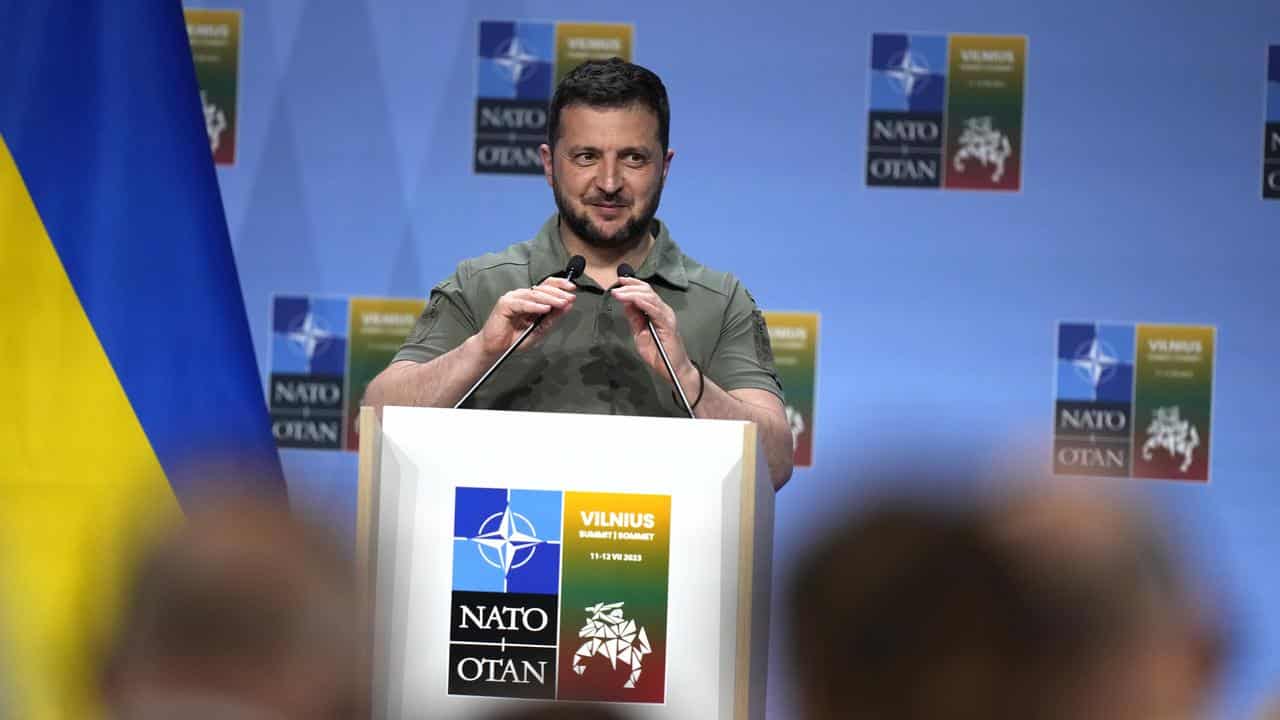
Long-term plans by G7 countries to help Ukraine's armed forces repel Russia's aggression are a "very much needed and meaningful success for Ukraine," Ukrainian President Volodymyr Zelenskiy says after a NATO summit in Vilnius.
He was more conciliatory in his remarks after sharply criticising a decision by the military alliance to not extend an invitation to Ukraine to join NATO on Tuesday.
"We're going to help Ukraine build a strong, capable defence across land, air and sea," US President Joe Biden said, speaking alongside Zelenskiy.
The United Kingdom, the United States, France, Italy, Japan, Canada and Germany make up the G7 group.
Other countries are invited to join the efforts.
The aim of the security commitments is to build up a military capable of fighting back Russia's ongoing aggression and future attacks.
They are to include modern equipment for Ukraine's air and naval forces.
The "security partnership" announced on Wednesday is to strengthen Ukraine by providing a long-term strategy it can rely on, German Chancellor Olaf Scholz said.
The latest pledges do not include far-reaching guarantees like sending troops to Ukraine in the event of a future attack by Russia.
Participating countries are to ensure "the continued provision" of modern military equipment for land, air and sea domains, "prioritising air defence, artillery and long-range fires, armoured vehicles, and other key capabilities, such as combat air," a joint G7 declaration stated.
Additionally, G7 members are to "increase and accelerate intelligence sharing, bolster support for cyber and hybrid threat defences, expand training programmes and military exercises, and develop Ukraine's industrial base," a press release from the UK government said.
"We can never see a repeat of what has happened in Ukraine and this declaration reaffirms our commitment to ensure it is never left vulnerable to the kind of brutality Russia has inflicted on it again," UK Prime Minister Rishi Sunak said.
In a first reaction, Russia said the long-term security assurances offered by the G7 to Ukraine are a threat to Russia's security.
"We consider this to be an extreme mistake and potentially very dangerous," Dmitry Peskov, spokesman for Russian President Vladimir Putin, was quoted as saying by Russian news agencies.
Peskov stated that if the G7 countries were to provide any kind of commitments to Ukraine, they would be ignoring the international principle of "indivisibility of security".
"This means that by giving security guarantees to Ukraine, they are violating Russia's security," he added.
Meanwhile, Russian state television reported the deputy chief of Russia's Southern Military District, Oleg Zokov, had been killed by a Ukrainian missile strike.
"Unfortunately, he died heroically, this person deserves high recognition, he had incredible authority in the armed forces," Duma deputy and retired general Andrei Gurulyov said on 60 Minutes show on Tuesday.
The Russian Defence Ministry has not yet officially confirmed Zokov's death.
Earlier, several Russian Telegram channels had reported that Zokov had died in the shelling of the Russian-occupied Ukrainian port city of Berdyansk.
The large city lies around 100 kilometres from the front.
In recent weeks Ukraine has significantly intensified the shelling of Russian rear command points, logistics centres and fuel and ammunition depots, using, among other weapons, the Storm Shadow cruise missiles supplied by the UK.
The 51-year-old Zokov was on the sanctions lists of the European Union, UK and New Zealand for his involvement in the invasion of Ukraine.
He is the sixth Russian general whose death has been confirmed since the war against Ukraine was launched by Russia in February 2022.




